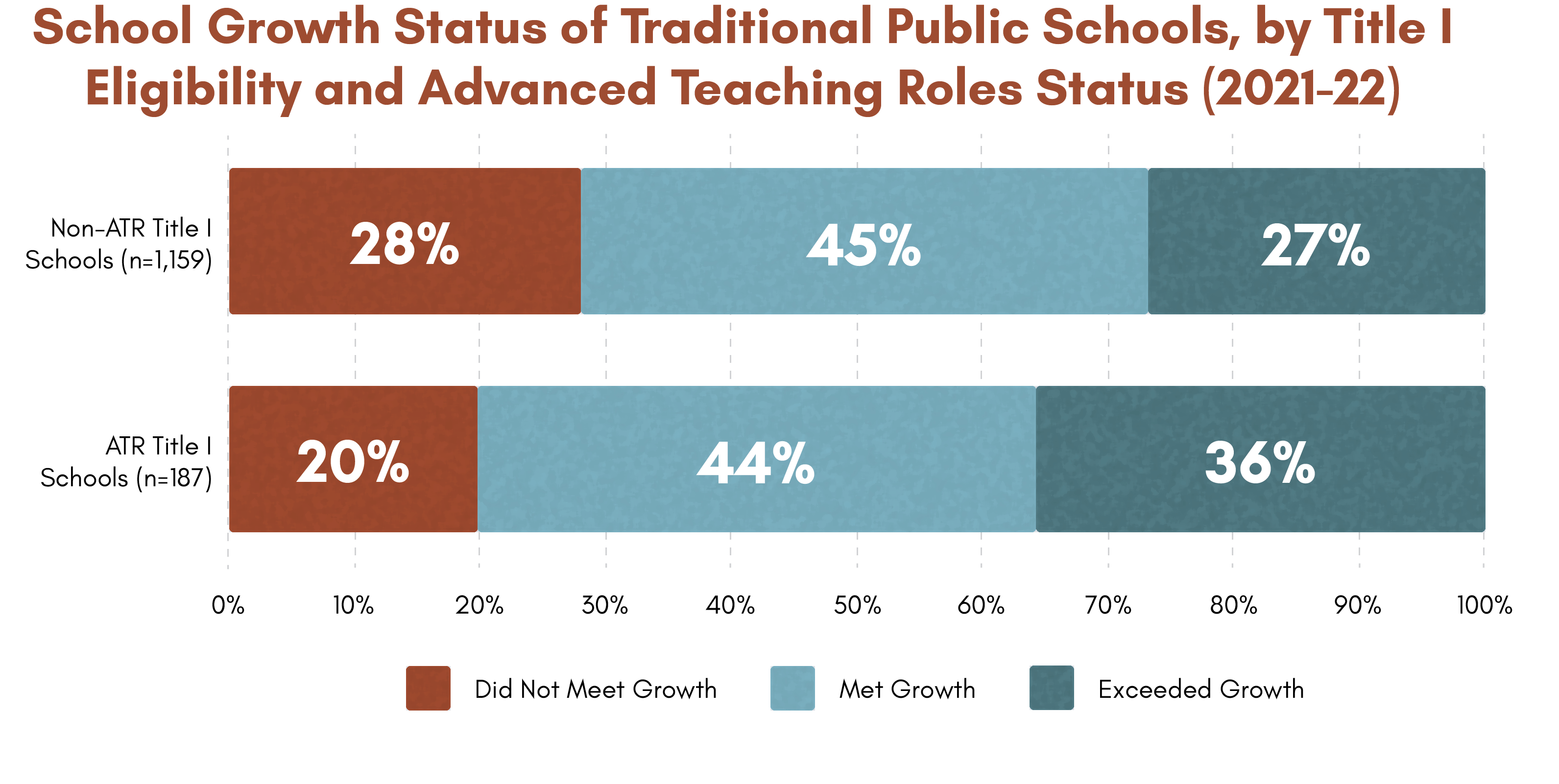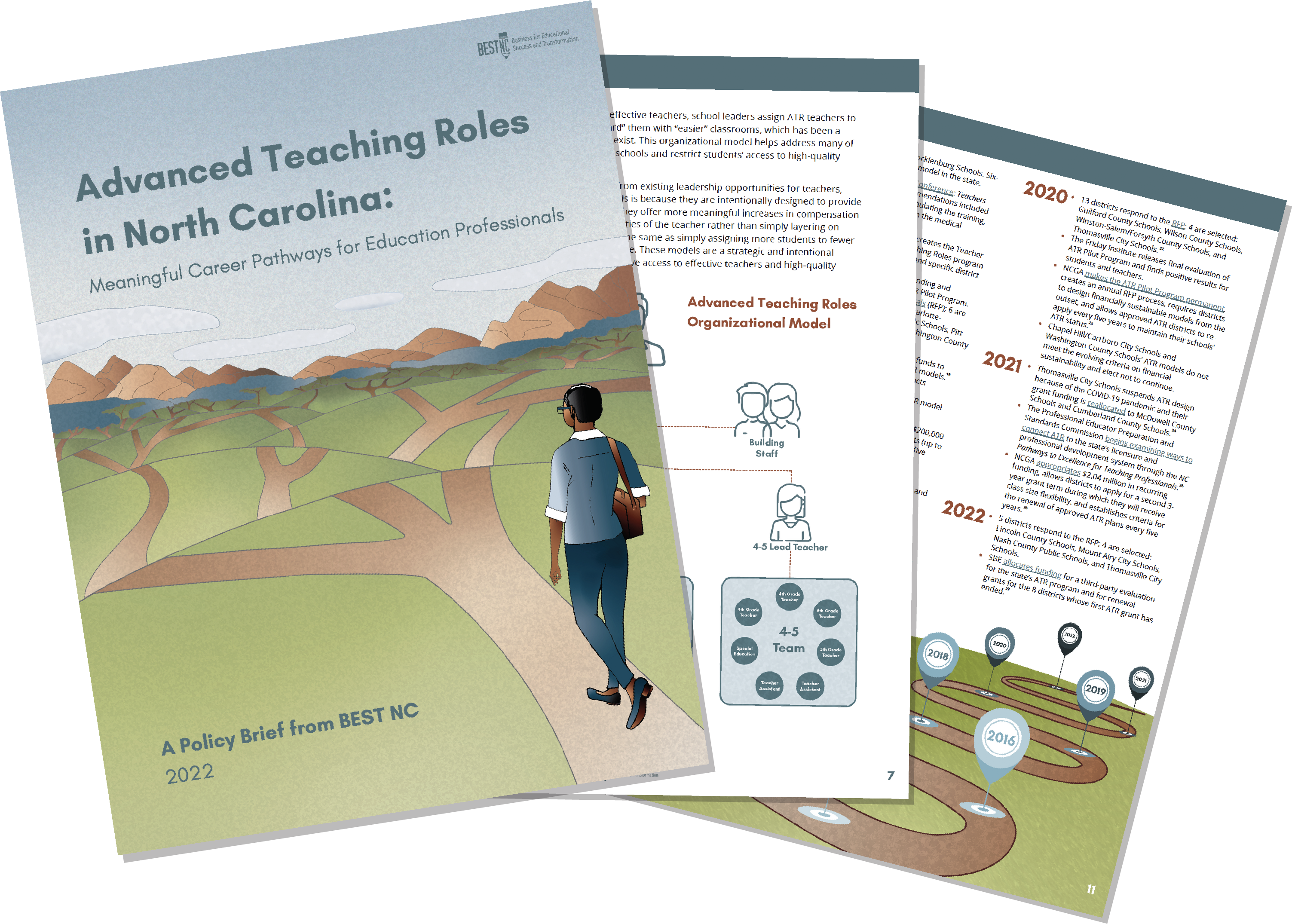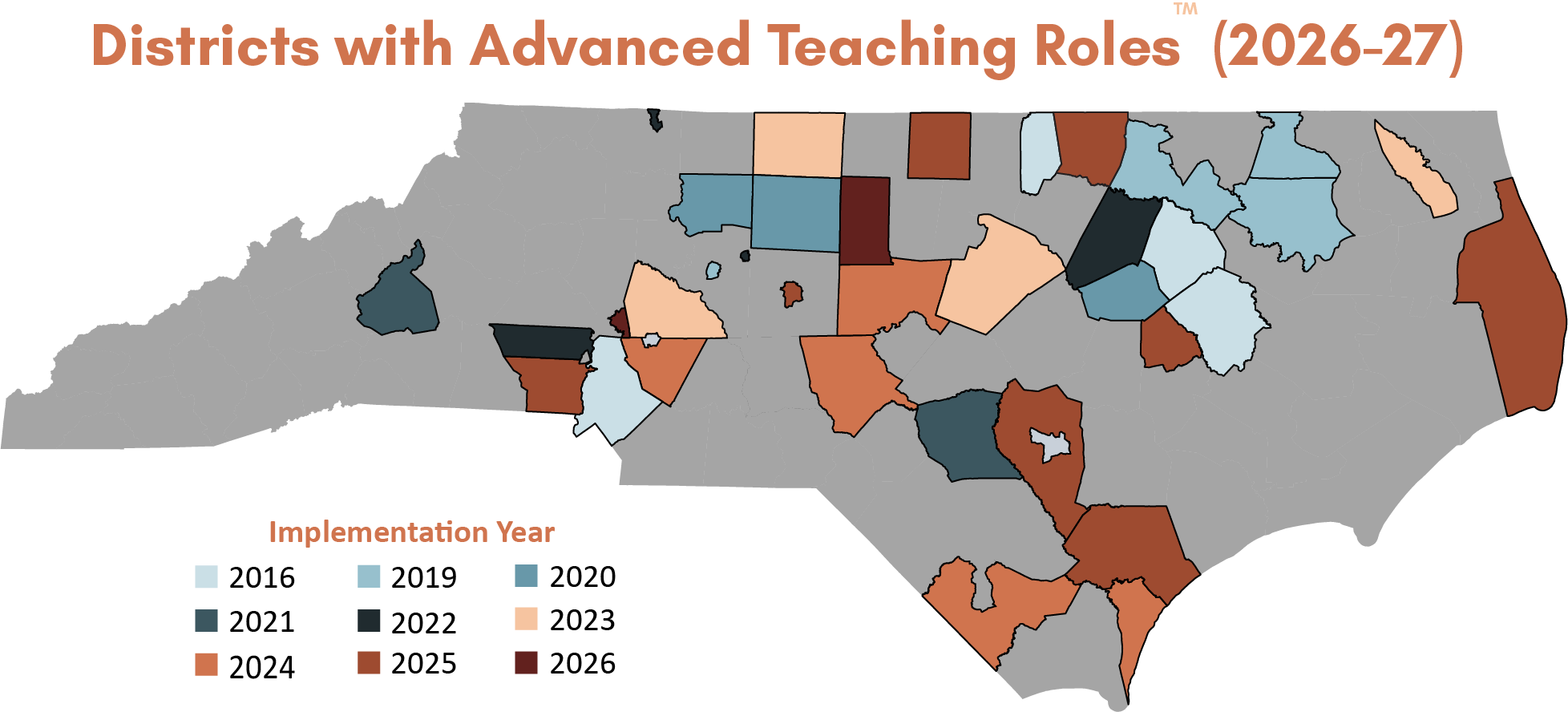
Advanced Teaching Roles™ in North Carolina:
Meaningful Career Pathways for Education Professionals (2022)
Today in North Carolina, Advanced Teaching Roles™ are providing new avenues for teacher leadership, modernizing outdated school organizational models, empowering school leaders, and improving student achievement. BEST NC is pleased to present this policy brief on our state’s Advanced Teaching Roles™(ATR) program, which explains what it is, captures the history of the initiative, summarizes the research on its impact, shares best practices for school districts, and provides recommendations for scaling statewide.
Download the full brief here or by clicking on the image.
Below you can also find executive summaries of the Policy Brief:
- Executive Summary (Updated 2025)
- Executive Summary for State Policymakers
A Closer Look at Advanced Teaching Roles™ in North Carolina Video Series
A Closer Look at Advanced Teaching Roles™
in North Carolina: Edgecombe County
Advanced Teaching Roles™ offers avenues for education professionals to realize their full potential, all while staying in the classroom with the stakeholders they’re most passionate about: their students. Watch this video and learn how, since 2016, Edgecombe County has enjoyed the benefits of this revolutionary school model, from embedded daily professional support for beginning and novice teachers, meaningful career opportunities and higher pay for lead teachers, to increased autonomy and organizational freedom for school leaders.
A Closer Look at Advanced Teaching Roles™ in
North Carolina: Charlotte-Mecklenberg Schools
The second video in the A Closer Look: Advanced Teaching Roles™ series examines how one of North Carolina’s largest school districts piloted this successful and transformative school model to meet the needs of its diverse student population. Charlotte-Mecklenburg Schools’ mission? To ensure that, one day, every student in their district has access to an Advanced Roles teacher. Nearly ten years in and with 80 schools implementing and counting, they’re well on their way to meeting that goal!
A Closer Look at Advanced Teaching Roles™:
A Culture of Collaboration & Continuous Improvement
In the third addition to the A Closer Look: Advanced Teaching Roles™ video series, we asked the educators at Palisades Park Elementary School in Charlotte, North Carolina how Advanced Teaching Roles™ fosters a culture of collaboration and continuous improvement in their school. Watch this video and find out what they had to say about their increased collaboration, access to support, and common misconceptions about how Advanced Teaching Roles™ models influence a school’s culture!
A Closer Look at Advanced Teaching Roles™ in
North Carolina: Implementing The Science of Reading
In the latest addition to the A Closer Look: Advanced Teaching Roles™ video series, we examine how ATR creates an environment that allows other innovations to grow and flourish. BEST NC sat down with principals in both urban and rural schools to talk with us about how they have been able to train their teacher leaders to successfully delegate and implement the Science of Reading in a way that would not have been possible without ATR.
Additional Videos on Advanced Teaching Roles™:
Treating Teachers like Professionals with Advanced Teaching Roles™
Let’s be honest: North Carolina, like other states, is having a hard time recruiting and retaining great teachers. Is it pay? Is it workload? Is it lack of career opportunities and respect? Well, it turns out that each of these barriers is a piece of the puzzle. But when we consider the whole picture, we can see that the way the teaching profession is fundamentally structured hasn’t kept up with other highly skilled professions. Learn more about how Advanced Teaching Roles™ work and why they are needed now more than ever in this short video!
Modernizing the Industrial Era Model of Education
North Carolina’s schools are organized more like factories from the Industrial Era than modern, human-centered workplaces of the 21st century. Even though our economy and the needs of our students have shifted tremendously since then, the fundamental way we design our classrooms and the way we treat our education professionals has evolved very little. How does that affect educators and students? And can it be changed? Watch this video and learn why it’s important these questions are answered now, not later.
In 2016, North Carolina launched the Advanced Teaching Roles™ program in order to:
- Enable outstanding teachers across NC to extend their reach to more students without leaving the classroom;
- Recognize teacher leaders with higher compensation;
- Provide developing teachers with embedded, on-going coaching and professional support;
- Allow principals to distribute leadership across the school building; and
- Most importantly – Improve student outcomes.
The ATR initiative has evolved with the continued support of the North Carolina General Assembly and other state education policymakers. There is now $5.5 million in annual funding available for grants to districts to support the transition to ATR models, with districts allowed to apply for up to two 3-year grant terms. In 2023, the North Carolina General Assembly appropriated $10.9M in additional recurring funding for ATR salary supplements, with $10,000 for each Adult Leadership teacher and $3,000 for each Classroom Excellence teacher.

Evidence of Success
While research on the impact of the initiative is going, both leading and long-term indicators of ATR success are promising.

Improved Student Outcomes
- ATR had a statistically significant impact on school-wide academic growth in math.
- ATR schools are more likely to meet or exceed expected student growth than similar schools not implementing ATR (see chart to the left).
- 81% of teachers receiving support from an ATR educator reported improvement in academic achievement in their classes.
Reported Greater Job Satisfaction
- 92% of teachers in advanced roles agree that Advanced Teaching Roles models allow them to be recognized for their expertise, and 85% agree that their role is valued by other educators.
- Educators working in schools with advanced teachers, but not serving in the roles themselves, also recognized the potential value of the initiative, with 76% reporting ATR would contribute to their professional growth and 62% reporting it would contribute to their career satisfaction.
Best Practices for Advanced Teaching Roles™ Models
Since the inception of the ATR program in 2016, North Carolina has learned important lessons about building sustainable models that promote buy-in from districts, school leaders, teachers, and staff – with a persistent, positive impact on student learning. As district leaders contemplate, develop, expand, and sustain ATR in their schools, they should focus on building sustainable models that are continuously evaluated and adapted to leverage the skills of educators and to meet the needs of students. Here are a few best practices in districts that can help to drive continuous improvement:
- Implemented in districts that opt-in to the model;
- Explicitly designed to increase student achievement;
- Developed locally with significant educator and community input;
- Designed to empower principals to align teaching skills with student needs;
- Capable of recognizing that educators have varying professional aspirations at different phases in their careers (lattices, not ladders);
- Financially sustainable within current budgets and offer substantial salary increases to advanced roles teachers for leading instructional teams and/or extending their reach to more students.
For more best practices see pages 18 and 19 of the Advanced Teaching Roles™ brief.

Additional Resources:
Data, Reports and Analysis:
- The Friday Institute’s 2023 Evaluation Report: Advanced Teaching Roles
- The Friday Institute’s 2019-20 Final Report on Teacher Compensation and Advanced Teaching Roles Pilot Program (Year 3)
- The Friday Institute’s Deep Dive in to 3 Advanced Teaching Roles Models: Teaching for the Long Haul: Professionalizing Career Pathways for North Carolina Teachers
- New teaching model yields learning improvement for students in math – The Brookings Institution
- FutureEd Report – Teaching Innovation: New School Staffing Strategies Inspired by the Pandemic
RFPs and Previously Approved Proposals:
News Coverage:
- News coverage from EdNC and the News & Observer
- ‘Opportunity Culture schools outpace state results in NC’ – News Coverage by EdNC
Videos:
- Advanced Roles in North Carolina: A Closer Look (5-minute video)
- First in Teaching Barrier: Lack of Access to Career Opportunities (5-minute video)




